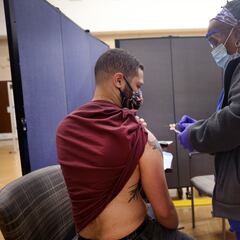What is a religious exemption for the Covid-19 vaccine? Are any religions against the vaccine?
As vaccine mandates increase around the country those who don’t want to get vaccinated are trying to use religious exemptions to dodge the jab. Can they?

As the number of covid-19 vaccine mandates grow around the US, so too does the number of people trying to get out of the requirement. The law grants two types of exemption to getting vaccinated either on medical grounds or because of “sincerely held religious beliefs.”
Are there any religions that have doctrinal reasons for not getting vaccinated? What is a sincerely held religious belief and what are the rules for the exemption? What do employers have to do when one of their workers can prove the exemption?
Also see:
- New York City covid-19 vaccine mandate for teachers put on hold
- Delta variant danger zones
- Biden: "This is a pandemic of the unvaccinated"
- FDA approves booster shots for certain high-risk populations
Most religions support vaccination
Across the nation companies, schools and government have issued vaccine mandates to get shots in the arms of those still refusing to do so on the grounds of making the workplace safer. These mandates have encountered opposition in the courts but so far judges have not ruled against requiring people to get vaccinated. There is a long history of the courts upholding vaccine mandates going back over 100 years even when people claim it goes against their religion.
Religious leaders have expressed few concerns over the covid-19 vaccines. Catholic officials initially objected to the Johnson and Johnson vaccine for using cell lines from aborted fetuses. But in the end said Catholics could still get the vaccine if there was no other available. In March the US Conference of Catholic Bishops said in a statement "being vaccinated can be an act of charity that serves the common good.” Since then, take up of the vaccine has rocketed among Catholics with nearly 80 percent vaccinated.
Few religions have doctrinal objections to vaccination. Dutch Reformed Church and Christian Scientists are examples but getting vaccinated is not prohibited. Jainism which preaches non-violence to all living things allows for vaccination even though it regrettably kills microorganisms as it is necessary to protect other lives. Many religions actually see getting vaccinated as a moral imperative in order to protect and preserve life.
JUST IN: Nearly 200 SFPD employees applied for a religious exemption to the city’s employee vaccine mandate. It's the highest number of waiver requests from any city department, by far.https://t.co/oIrIrlX4oC
— San Francisco Chronicle (@sfchronicle) September 24, 2021
“Sincerely held religious beliefs”
Title VII of the Civil Rights Act of 1964, which enshrines protections for religious objectors, says that private companies must make “reasonable accommodations” for workers who have “sincerely held” religious beliefs that may conflict with vaccination or other aspects within the work environment. A religious belief is not limited to “just practices that are mandated or prohibited by a tenet of the individual’s faith,” according to rules laid out by the Equal Employment Opportunity Commission.
Likewise, the religious belief can be " new, uncommon, not part of a formal church or sect,” as well as “seem illogical or unreasonable to others.” However, Title VII does not cover all beliefs. Mere personal preferences, as well as social, economic or political views are not considered religious beliefs that should be protected.
The sincerity of the stated religious belief is “largely a matter of individual credibility,” and is not usually in dispute. Simple lack of scrupulous observance doesn’t forfeit one's religious rights. However, if there is evidence that the employee “acted in a manner inconsistent with his professed religious belief,” it may be used to evaluate the sincerity of the claimed belief. Similarly, the timing of the request or the “accommodation sought is a particularly desirable benefit” can render it suspect.
The @NBA denied Andrew Wiggins' request for a religious exemption from getting vaccinated against COVID-19.
— ESPN (@espn) September 25, 2021
He will not be able to play Warriors home games until he fulfills San Francisco's vaccination requirements, the league said. https://t.co/98YySOPuXW
Employers must make reasonable accommodation
Related stories
Once an employer is informed of the sincerely held religious belief, they are required to reasonably accommodate an employee. That is unless providing the accommodation would create an “undue hardship” on the employer. If an employer can’t provide accommodation, they can choose to fire the employee. Should they be sued, the bar for using the “undue hardship defense to providing religious accommodation” is fairly low. The Supreme Court has ruled that they show “more than a de minimis” cost or burden.
Employers can do factfinding to find out if the religious objection to getting vaccinated is based on politics, ideology or medical concerns and not a sincerely held belief. However, it is very difficult to test whether a worker’s claim is sincere. “It’s not a good idea to question the sincerity of somebody’s religious belief,” Mark Phillips, a partner at the Reed Smith law firm told the LA Times. However, if the worker sues, it will be the employee's responsibility to prove they were motivated by a sincere religious belief in court.


